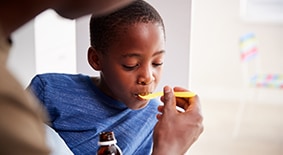What Is RSV, and How Does a Child Get It?
Respiratory syncytial virus (RSV) is a common, highly contagious virus that affects people of all ages but is most severe in young children and older adults.
“Most children have one RSV infection by the time they’re 2 years of age,” says Andi Shane, MD, MPH, MSc, System Medical Director of Infectious Diseases at Children’s Healthcare of Atlanta. “The virus spreads easily by contact with droplets from sneezing or coughing and droplets on unwashed hands, counter tops, crib rails and toys.”
RSV infections typically occur from late fall through early spring, spreading rapidly through childcare centers, schools and any other place where people have close contact with each other. In otherwise healthy children, RSV typically results in coughing and a runny nose, with a fever that resolves in about one week.
What does RSV mean for babies and children with chronic illnesses?
Babies can frequently get a run-of-the-mill cold. But if your infant’s runny nose and cough turn into more serious breathing trouble, the problem could be RSV, which is potentially life-threatening for little lungs.
In children who were born prematurely and in those with other medical conditions such as lung or heart conditions, an RSV infection can be more severe.
What Are Symptoms of RSV in Babies and Kids?
In otherwise healthy children, RSV symptoms may look like a common cold and include:
- Congested or runny nose
- Cough
- Fever
Symptoms of an RSV infection usually last about a week but, in some cases, can last longer. “If your child’s symptoms are mild, supportive care such as fluids and fever-controlling medications may be all that is needed,” Dr. Shane says. “Cough and cold medicines do not help to relieve symptoms in young children and should be avoided. Giving a fever-controlling medication that does not contain aspirin may be helpful.”
What RSV Looks and Sounds Like in Babies
Parents and caregivers, please watch. RSV can affect babies and kids of all ages, and if you see labored breathing that looks or sounds like this, contact your child’s doctor immediately. RSV (respiratory syncytial virus) can be more than a cold, and knowing the warning signs can be lifesaving.
Watch VideoWhen Should I Call the Doctor?
Seek medical care if your child has any of the following symptoms of RSV:
- Difficulty breathing or fast breathing with tugging of the chest muscles
- Gray or blue-tinged skin color (this typically shows up on the lips and fingernails)
- Wheezing–a high-pitched noise usually heard when a child exhales
- Apnea (stopping breathing)
- Extreme tiredness
- Refusal to drink liquids or breastfeed
- Decreased number of wet diapers
Your healthcare professional may take a swab of your baby’s nasal fluids to confirm if the problem is RSV.
Some other conditions associated with RSV infections include:
- Ear infection
- Asthma–possible link between severe RSV in children and the chance of developing asthma later in life
Treatment and Prevention
“Children who may have difficulty breathing and staying hydrated are usually hospitalized so they can get oxygen treatment, and intravenous fluids,” Dr. Shane says. “For mild symptoms, make your child as comfortable as possible and provide plenty of fluids.”
Some other tips for at-home care include the following:
- If your child is too young to blow their nose, use a nasal aspirator or bulb syringe to remove sticky nasal fluids.
- Treat fever with acetaminophen—never aspirin.
If your child has difficulty breathing and is unable to stay hydrated, contact a healthcare professional immediately.
Like the common cold, the most effective way to avoid infection is to encourage good hand hygiene in children and adults. Some other ways to prevent your child from getting sick:
- Avoid others with cold-like symptoms or a fever.
- Insist that everyone who comes close to your child practice good hand hygiene. RSV is easily spread from person to person by contact.
- Don’t smoke. Exposure to tobacco smoke increases the risk of severe RSV illness.
We can all do our part to protect babies and young children from RSV infections. And knowing the symptoms of a more severe RSV infection can be lifesaving.
Keeping Your Kids Safe and Healthy
Contact Us 404-785-KIDS (5437)





